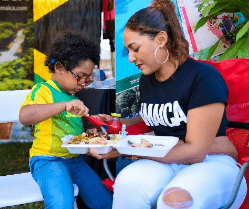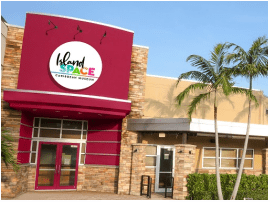Jamaican Flag Flies Over “Caribbean Republic” of Brooklyn
BROOKLYN – Jamaicans represent the third largest immigrant population in the City of New York, with the majority of persons calling Brooklyn their home. These and other Caribbean immigrants account for one-in-five of the foreign born citywide. For 24 hours this week, the black, green and gold flag of the island-nation of Jamaica flew over the borough, partially underscoring the legitimacy of one of its monikers, “Caribbean republic.”
On Thursday, August 7, 2008, myriad Jamaican- and Caribbean-American groups joined Brooklyn Borough President Marty Markowitz and his Special Assistant, Jamaican-born Yvonne Graham, on the plaza of Borough Hall. While singing the U.S. and Jamaican national anthems, members of the community raised the Jamaican flag over the borough’s preeminent political edifice in celebration of the country’s 46th independence.
The New York City Department of City Planning’s Population Bureau reported that there were more than 75,000 Jamaican-born persons residing in the borough in 2006. Many estimate that the numbers are significantly higher and warrant special approaches in order to properly account for and serve the needs of this community.
The celebrants chose to recognize several in their community on Thursday, including Major Victor Terrelonge, Tuskeegee Airman and World War II hero. Terrelonge served in the war while Jim Crow laws and discriminatory conventions organized much of the landscape of the United States. He shared several anecdotes about his intense training and colorful war-time duties as an airman. Terrelonge also spoke pointedly about having to navigate a United States then bound by legal segregation, a reality that also shaped the country’s military institutions. Jose Richards of Sons and Daughters of Jamaica paid tribute to Major Terrelonge by sharing Claude McKay’s classic poem, “If We Must Die” which honored the brave spirit of many who fought injustice in that pivotal mid-century moment. Over the decades, the Tuskeegee Airmen have been actively involved in youth development initiatives nationally.
Amir Abdul-Akbar, principal of Caribbean American Program for Empowerment (CAPE-USA), was another honoree. Abdul-Akbar has been the chief engineer of this event over the years but this year, this stalwart was unable to execute his rich plans due to illness. His peers in the Jamaican- and Caribbean-American community rallied hard to bring the program to fruition.
Also recognized was Domestic Workers United, a Bronx-based collective that advocates for fair wages and other labor improvements for domestics including nannies, housekeepers, and elder care workers. A highly invisible sector, domestic work has long been a labor market point of entry for immigrant women including the Irish. Today, the sector is dominated by Caribbean, Latina and Asian Pacific American women. One of the goals of the organizers is to move domestic work out of the informal sector. Lois Newland, a Jamaican-born organizer, accepted on behalf of DWU.
There was a singular undercurrent to the presentations. Each speaker noted that Jamaicans and other Caribbean people have had a significant presence in North America for much of the 20th Century, building and contributing to all facets of life in the United States. The speakers all reflected on the fact that the community was achieving critical mass and coming of age. Some looked at the increasing number of Jamaican contenders for public sphere leadership as evidence of this maturation. For example, Graham has announced her bid to succeed the term-limited Markowitz. If successful, she would become the first Caribbean American borough president in Brooklyn. Also among the initiatives discussed was CaribID2010, an intervention aimed at securing national origin designation for Caribbean Americans on the upcoming decennial census.
Markowitz, known as much for his good humor as for his role as head cheerleader of all things Brooklyn, graciously acknowledged the hard work of Jamaicans and other Caribbean nationals in the borough. He urged the community to strengthen its growing political leverage by organizing financial and other capitals to actualize its goals.
In her message, Graham paid tribute to the iconic leaders of Jamaica who struggled against slavery and colonialism to usher in the nation-state in 1962. She suggested that standing on the shoulders of these leaders offers Jamaicans a particular vantage of themselves and the world. Graham said, “I encourage the organizations here present to explore the concept of Diaspora philanthropy…[to support] donors and investors becoming directly engaged in the social and economic development of towns or parishes …to build partnerships between home and Diaspora communities.”
Patrick Beckford, North East USA Board Member of the Jamaica Diaspora Movement, urged Jamaicans to think about how they might become greater stakeholders in the political processes of the United States. Beckford expressed that enumeration is a key variable in Jamaican-Americans being better able to help their families in the country of origin. “The Movement wants to support your efforts as you create the best lives for your families and your communities here in North America. At the same time, we want the best lives for our families and communities back home,” Beckford said. “Let us build a bridge of strength [between the United States and Jamaica] using construction agents who are themselves fully empowered…we must stand up and be counted as new Americans.” Beckford pointed out that Jamaicans must enter into strategic alliances with other Caribbean immigrants, underrepresented native-born groups, and others.
Congresswoman Yvette D. Clarke (D-NY) and New York State Assemblyman N. Nick Perry – both of Jamaican heritage – also brought greetings to the gathering. Deputy Consul General of Jamaica in New York, Lisa Bryan-Smart, delivered an independence message from recently-elected Jamaican Prime Minister, Bruce Golding.
Basil Wilson, a political scientist and former Provost of John Jay College of the City University of New York, offered a treatise on Jamaican and Caribbean contributions to the United States over the arc of the 20th century. Wilson’s academic work includes text co-authored with Hunter College’s Charles Green, The Struggle for Black Empowerment in New York City: Beyond the Politics of Pigmentation (McGraw-Hill, 1992). He is also a featured columnist with a New York-based Jamaican-owned weekly newspaper.
E. Wayne McDonald, artistic director of the Caribbean Cultural Theatre, served as Master of Ceremonies. Bishop Cecil G. Riley of Central Brooklyn’s Freedom Hall Church of God delivered the invocation. Sheila Dallas-Katzman, director of One World Theatre Company, presented two poems from the Jamaican literary canon. The first was a Louise Bennett classic highlighting the gaiety of Jamaica’s first independence. The second — by Jamaican-Canadian Afua Cooper — wrestled with ancient mythologies, environmentalism and existentialism as its themes.

(Standing L-R) Patrick Beckford, Board Member – Jamaica Diaspora Movement North East USA, Cecil G. Riley, Bishop – Freedom Hall Church of God, Yvonne Graham, Special Assistant to the Brooklyn Borough President, Major Victor Terrelonge, Tuskeegee Airman, Carlene Gordon, Caribbean American Program for Empowerment (CAPE-USA) representing Amir Abdul-Akbar, and Irwine Clare, Caribbean Immigrant Services
(Photo by: Donna Mason)
Sponsoring organizations included Caribbean American Program for Empowerment CAPE-USA), Caribbean Cultural Theatre, Caribbean Immigrant Services Youth Core, Jamaica Diaspora Movement North East USA, Jamaica Impact, Inc. (JAMPACT), Jamaica Progressive League, Sons and Daughters of Jamaica, and the Union of Jamaica Alumni Associations.


